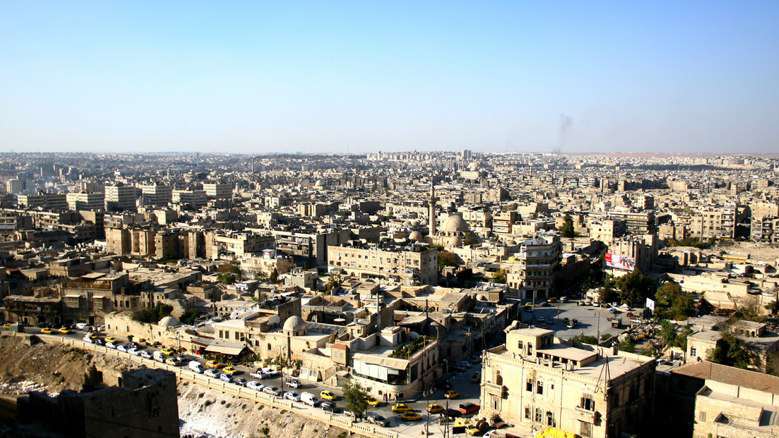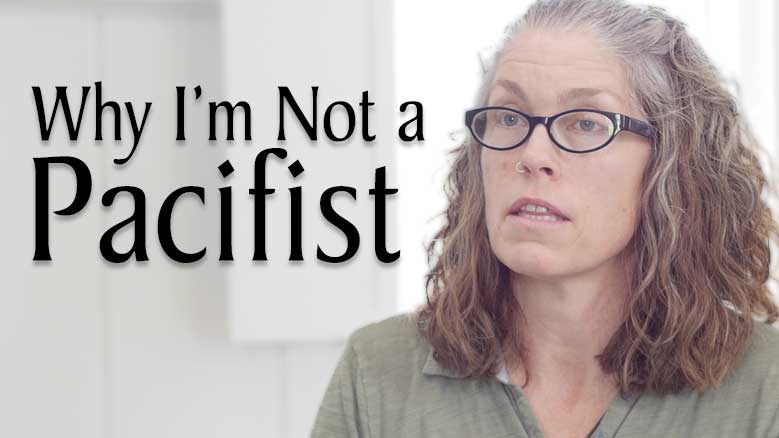
“Abhorrent to civilization,” said John Pershing, commander of America’s World War I Expeditionary Force. Poet Wilfred Owen described the horror: “Guttering, choking, drowning . . . the white eyes writhing . . . the froth-corrupted lungs.” Today, such monstrousness from Syria comes to us televised on YouTube. Is firing missiles the right way to stop it?
I’m a Quaker, a conditional pacifist, and a conscientious objector. War, killing, bombs, missiles—these things all disgust and terrify me, as I’m sure they do most Friends Journal readers. In my country of origin, apartheid South Africa, I tore up my draft papers. Here in the United States of America, I wrote “Objector” on my selective service registration, and as an American citizen, I haven’t backed a single war in the last 20 years.
One reason is my Quaker faith. Like Friends for 400 years, I view violence as counter-productive. We fight for peace, and then, like in Iraq, we end up making things worse. Then, too, war is inherently criminal. It extinguishes “the light within,” bringing evil and darkness to the world. There’s no getting around this basic fact about military conflict, which is a core wisdom we Quakers have to share with the larger community.
Then, too, as an immigrant, I’m aware how America is often viewed as arrogantly appointing itself as global police officer—while in the process also giving a free ride to other nations who benefit from our violence by sharing in “rich world privilege,” but who wish to keep actual blood off their hands.
Given all this, you’d think President Obama’s war powers request would be a no-brainer for me, the way it is for most of my fellow Friends. You’d think I’d be calling my Congressional representatives this week to ask them to vote, “Hell, no.” However, it isn’t that simple for me, and in fact I have decided to abstain, on principle, from participation in the specific missile strikes authorization debate. Here’s why.
First, the president seems sincere in his belief that missile strikes are in fact the antiwar position here. As one commentator put it this week, the proposed missile strikes are like United Nations peacekeepers, warlike in form, but antiwar in content. Despite its strategic importance, President Obama has spent two years working desperately to keep America out of the Syrian mess. I detect no macho swagger in his appeal for support, no underlying message of “We are America-the-righteous, and we’re gonna get ’em.” This mild and cautious style isn’t a reason to approve his request, let alone agree with the moral reasoning, but it does make me sit up straight and listen.
Second, this is the first American military action I’ve ever been asked to back that doesn’t aim to reshape the world according to a superpower’s desires. As a foreign-born American, it’s important to me Obama said he’s not trying to accomplish regime change. That would have been imperialism. I’m opposed to all wars, not just imperialistic ones, but the fact that this is structured more as policing than regular warfare makes it a harder for me to oppose than the usual military interventions.
Third, if media reports are accurate, Russia will veto a peacekeeping intervention in Syria no matter what evidence is uncovered about the Assad regime’s violation of the Geneva conventions. Quakers have always been active in the United Nations and, before that, in the League of Nations. But if we have reached the point where the United Nations cannot agree to censure a historically pathbreaking crime against humanity, then the truth is we have no global system, and U.S. vigilantism becomes more understandable, if not exactly acceptable.
Last, but most importantly, I come from the developing world. The people who have just “guttered, choked, and drowned” to death seem like my friends and neighbors. They are not “those people” with “their challenges.” I can’t shrug, like so many antiwar Americans seem to have been doing this week, and say, “Not my problem.” I’ll admit Quakers have been less guilty of this than the general antiwar left, but still there is a natural tendency for those of us in the rich world to just want to enjoy our prosperous stability and let the rest of the world suffer—a tendency that morally horrifies me. I just can’t do it.
As a Quaker, I know war is not the answer. Both peace in Syria and deterrence of chemical weapons need to be nonviolent and substantial, like enlisting the help of Iran’s new president to negotiate a settlement agreement, extraditing those who gave the sarin gas orders to the International Criminal Court, and boycotting powers—the Moscow Winter Olympics?—that stand in the way of the United Nations living up to its responsibilities.
But as of the time of writing, I can’t actually bring myself to call my congressional representatives and request a no vote. After all, it was no less a moral authority than Mahatma Gandhi who said, “It is better to be violent . . . than to put on the cloak of non-violence to cover impotence.” Without a well-developed idea of nonviolent deterrence on the table—and isn’t yet, the efforts of Quaker organizations notwithstanding—I feel like I’d be advocating impotence instead of nonviolence. I feel I’d be abandoning my developing world friends and neighbors to Assad’s war crimes. I feel like I’d be saying the guttering and choking is acceptable so long as it doesn’t happen to me.
So for now, at least, I must abstain from any political action on the president’s war powers request. It’s the only morally acceptable choice to me in a tough dilemma, and as far as I’m concerned, my Quaker pacifist conscience requires it of me.
Photo of Syria 11/5/08 courtesy Nicolas Mirguet, flickr/scalino (CC BY-NC 2.0)
An earlier version of the piece appeared in the Harrisburg Patriot-News.



I guess I’m trying to understand the logic here. What is it exactly about this particular proposed war that makes the author ambivalent? Isn’t there always some good excuse for war? It’s just what the politicians do. They say civilians are going to be killed in Benghazi, there is going to be a massacre. Then we drop the Libya bombs. Or Saddam is going to fire nerve gas over London. Or they say it’s self-defense, like the Taliban harboring Al-Qaida, which killed 3000 Americans. How do we as Quakers say no to all of these but we abstain from saying no to this?
Please help me in understanding not taking a stand. We can as a nation, use missiles on Syria and kill people like the chemical weapons or use friendly countries in the United Nations, to help find alternatives to their civil war. Taking a neutral position is very difficult position for me. Earlier this year, Kraig Kline, a Mennonite in Lancaster Co. PA, was stepping toward my rough cut with a chainsaw in his hands. I waved him away and he ignored me. So, I was stupid and ran to the stack and jumped on to it with only socks on. With a little slide, I reached out to touch his butt with my finger tips, to stop any collide. He stepped off the stack and claimed he was attacked by being pushed. According to the 3 Pennsylvania State Officers, who were called, I had harassed him, even though he was stealing $2700.00 worth of hardwood lumber. No one was hurt in any way except me, after Ryan Klopp, Lebanon Co PA, had attacked me. They received nothing for their actions, but I’m paying for my offence. Although there are many ways in which I could have retaliated personally, all I have done is try to apologize. Kraig Kline refused to accept an apology and Ryan Klopp continued to steal my lumber. I could have been like the President wishes to do and be offensive by using a gun and shooting them. The situation would have been no better for them or me. If the United States uses weapons in Syria, Peace will be even harder to reach.
This article is deplorable to me. It is merely another instance of giving Obama a free pass because he’s a democrat. If Obama is so sincere about his desiring peace in the region, why the continued drone strikes in Pakistsn? Why did he jump to a military conclusion in Libya? Why the support of prosecution for Chelsea Manning, one who exposed the crimes of war committed by our military?
You can’t be neutral on a moving train! The author can try to present their self as “neutral” but this is clearly to me a very war supporting article. Chemical weapons were used, and this is so deeply disturbing, but the answer isn’t to use violence to “teach a lesson,” which is the president’s position. Such should be a black and white issue, I think.
Oh, and what does a conditional pacifist mean anyways? I’m a pacifist when I wish to be and not when the candidate I voted for calls for war? The majority of the Republican Party seems to fit that bill.
thanks very much for a thought-provoking article, and responses. I wish we Quakers would be more open to “sitting with the tension of ‘no good solution'” on a whole array of political issues that are dividing people. One might even consider the “sitting with the tension” as a modern manifestation of what our Quaker forebears called “waiting on the Lord.” 🙂
[…] Diane Randall on October 2, 2013 Glen Retief’s recent letter to Friends Journal, “A Pacifist Reconsiders Military Action in Syria,” reflects the dilemma many Friends feel about our country’s role in confronting brutal […]